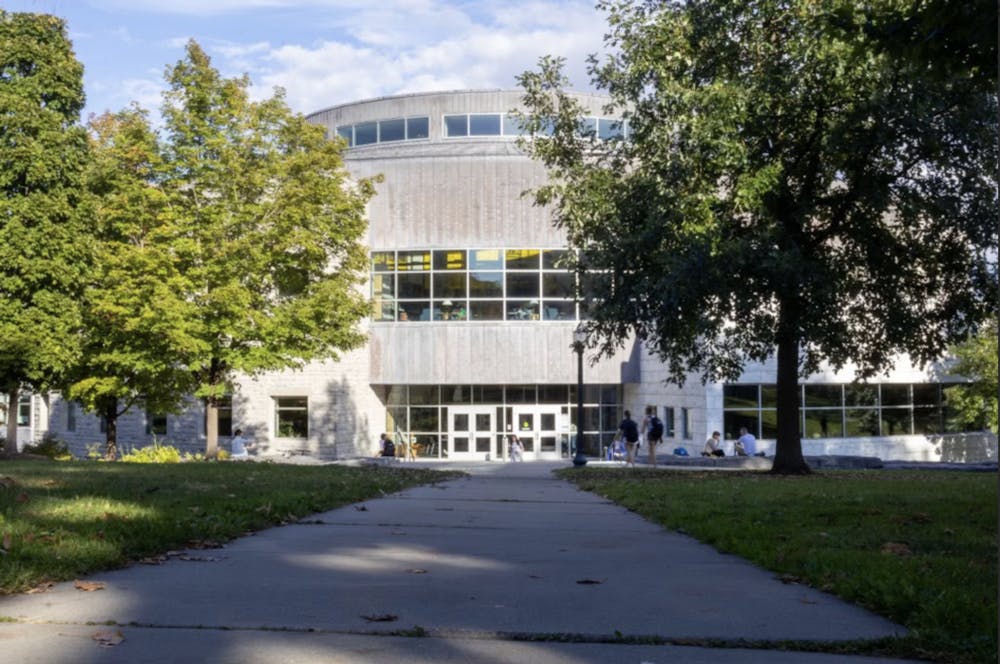Senior Research and Instruction Librarian Brenda Ellis retired on Wednesday after over 23 and a half years in her position, making her the seventh librarian to depart from the college in the past two years and the third in the past five months.
Her former position, the Film and Media Librarian position and a Catalog Librarian position are all freshly vacant, joining the Science and Data Librarian position that has remained empty since the spring of 2023. Since February 2020, the library has seen 14 full and part-time staff members leave, creating a turnover rate of 44%, according to Dean of the Library Mike Roy.
Ellis cited the skill matrix pay system, demoralization from an increased workload and the departure of her colleagues, a lack of career ladder and promotional opportunities, and other factors on which she declined to comment as reasons for her early retirement. Other librarians raised similar concerns, sharing that some of their former colleagues pursued work at other institutions or left librarianship completely for the same reasons.
The skill-based compensation system known as the “skill matrix” system was implemented by the college’s Human Resources department in July 2022. In this system, salary ranges are determined based on market data from the previous year at other institutions the college claims are its peers. An employee’s pay within that range is then determined by their manager’s assessment of their performance, placing them in one of four categories: “learning,” “growing,” “thriving” or “leading.”
Ellis and Terry Simpkins, director of discovery & access services, identified several problems with this system of compensation that have impacted positions at the library in particular.
The salary of many librarians who have already hit the “leading” mark is too close to the top of the market-determined range of pay to allow them to continue to receive raises, as this system implements a cap on their pay that did previously exist. The only way to improve their salaries is to be promoted to a higher position, but there are not always opportunities to do so.
“The fact that we have hard caps on our salaries just tends to discourage people — even if they come in and they’re not at the top of the range, I think knowing that there’s a hard cap will make people second guess whether they want to work here,” Simpkins said.
The market that the skill matrix uses to determine salaries does not include many of Middlebury’s top peer institutions, such as Amherst College and Williams College. It instead draws from larger colleges and universities with much smaller endowments than Middlebury, lowering the average salary to which the skill matrix is calibrated. This is the largest factor that lowers the pay of librarians in comparison to what their salary would have been under the guise of the previous compensation system, according to Ellis. She also pointed out that employees in the “thriving” category also only receive the market average pay despite their performance.
Ellis and Simpkins also explained that the system does not account for inflation. Simpkins stated that Human Resources may view the market analysis as a proxy for inflation, however, the data from market assessments is drawn from the previous year and is therefore not up-to-date with current inflation rates. It is also taken from institutions that are not in Vermont, where inflation is significantly higher than in other states. The current system also does not take the local high cost of living — which prompts many staff members to commute long distances, including from New York — into consideration.
When the Board of Trustees met in Davis Family Library during their biannual visit to campus to discuss and vote on the year’s budget last spring, Ellis, Simpkins and two other librarians spoke to trustees about their dissatisfaction with the comparison market and skill matrix system. Ellis recalled sharing copies of The Campus’ April 4 staff issue — whose front page features the headline “After nearly two years, staff still give mixed reviews on ‘skill matrix’ compensation system” — with several board members, hoping to further attract their attention to the problem.
However, the only significant change made to the system for this year resulted in still less additional pay for many college staff members: Discretionary pay, a previous third component of the skill matrix system designed to recognize exceptional work, was completely eliminated from the budget.
In previous years, this extra money was given to supervisors, who could allocate it in increments of $500 to up to $3,000 per staff member to recognize especially strong performance in a given year. The college’s total budget for discretionary pay this year was planned to be $400,000, but Executive Vice President of Finance and Administration David Provost announced to staff at the end of last spring that the college’s Senior Leadership Team assessed the Board of Trustee-approved budget for this year and was unable to provide the funds, Simpkins told The Campus.
“I remember thinking, this feels like a bait and switch,” Simpkins said. “Compared to the overall budget, [400,000] is a pittance. If you have somebody making $40,000–50,000 a year, $3,000 is a lot of money for them. That really just hit home for me. The staff should be the last place that the college cuts. It feels like often, we’re one of the first on the chopping block..”
This change, the understaffing in the library and the high rate of employee turnover means that librarians are simultaneously facing limited pay and higher workloads. Three librarian positions were also eliminated after their previous holders left during the Covid-19 pandemic: a part-time Assistant to the Dean of the Library, a librarian working in preservation of government documents, and a Literature and Cultures Research Librarian, causing the same workload to be distributed among fewer people.
Roy has heard faculty members express concern over a lack of liaisons to direct their library-related questions to. With less staff, Roy explained, liaison assignments have gone unfilled. Faculty is instead directed to an email inbox to submit their questions, which the appropriate librarian will answer.
“It’s much less personal and personalized: It’s a triage of just asking questions but not developing relationships,” Roy said.
Staffing the research desk has also been difficult and will pose further obstacles with Ellis’ position now vacant. Librarians calculated the hours that attracted the most questions from students — Sunday to Friday from 1–5 p.m — and hired Research Librarian Chris Glass part-time to help cover these slots. However, Mondays will soon be eliminated due to Ellis’ departure, according to Alyssa Wright, director of research, instruction and data services. This is a reduction from the library’s hours from previous semesters, which started at 11 a.m Mondays to Wednesdays and included evenings. Beginning Oct. 29, Glass will cover evening hours from 7–10 p.m on Tuesdays to assist with midterms.
Research librarians have had to conduct consultations with students in areas outside of their specialties, pitching in extra hours to ensure that every student can get the help that they’re seeking, according to Ellis. She said that temporarily taking on more liaison departments and instruction have been the biggest factors in increasing her and her colleagues’ workloads.
Simpkins has had to take on extra tasks helping to set up the library’s new cataloging system — work the vacant position of Cataloging Librarian would normally complete.
“I’ve been trying to pick up the slack with rushes, things that are ordered specifically for people, ordered by faculty, those need to get in there so that you can use them, so I make sure some of that stuff gets done to help support the other cataloger,” Simpkins said.
Longer-term projects such as working on the data repository and user experience studies of the library’s website have been pushed to the side to prioritize student-facing tasks, according to Wright and Roy. Ellis shared that another challenge has been pushing long-term projects aside to prioritize training the library’s several new employees. New librarians may have experience from elsewhere but be unfamiliar with Middlebury’s specific systems, which can take some time to learn.
“Middlebury is expensive, much smaller, much more high-touch, much more customized to the student experience. When you bring people from the outside they may or may not have that kind of experience to share,” Ellis said. “A lot of what I do is through collaboration and a lot of the people I collaborate with left. Now we’re short staffed so we don’t have the time to develop those relationships.”
Roy echoed Ellis’ concerns about the strain of high employee turnover on the library.
“I’ve also been spending more and more time thinking about the culture of the library, realizing that if you’ve had the amount of turnover that we’ve had and if 40 percent of the staff is new, just the kind of tacit knowledge that people gain with decades working at an organization is all lost,” Roy said.
The search for a new Science and Data Librarian and Cataloging Librarian has been underway for well over a year, the search for a new Film and Media Librarian will launch this fall and the search to fill Ellis’ position will begin in January. However, multiple librarians reiterated that the hiring process is long, as candidates must undergo multiple rounds of interviews, visit campus and decide on whether to take the job if given an offer.
Ellis spoke to the demoralization and discouragement that her and her colleagues have faced at work in recent years, calling on the college and the Board of Trustees to devote greater attention to the true costs of eliminating positions and high rates of turnover.
“It’s demoralizing to stay in a situation that you feel was not as good as it was just a few years ago, it’s demoralizing that all the people you worked with and really cared about are gone. It has increased the stress and it affects work life balance and family life, which affects people’s health,” Ellis said. “The college administration and Trustees need to think about how there’s an impact of higher healthcare costs, and there’s the financial impact of the cost of turnover and reduced productivity. Those kind of costs never go into spreadsheets. They’re being penny wise and pound foolish.”
As a member of Staff Council and the Chair of the Compensation and Benefits Committee, Simpkins emphasized that he believes Human Resources has staff’s best interests in mind, and noted that Caitlin Goss, vice president of Human Resources, is only one voice on the Senior Leadership Team. In Simpkins’ conversations with the Board of Trustees on this issue, members have cited the deficits created by the poor financial decisions — decisions which the Board approved — of previous College President Ron Liebowitz as justification for tightening the current budget.
“There were some bad decisions made about where we’re spending our money,” Simpkins said. “That money could be better used maybe in different ways, and those are hard conversations to have because those would mean serious changes to the college, but I am skeptical that until those decisions are made, that things are really going to get much better.”

Madeleine Kaptein '25.5 (she/her) is a managing editor.
Madeleine previously served as a staff writer, copy editor and local editor. She is a Comparative Literature major with minors in German and Art History. In Spring 2024, she studied abroad in Mainz, Germany, from where she wrote for the Addison Independent about her host country. In her free time, she enjoys journaling, long walks and runs, and uncomplicated visual arts projects.




